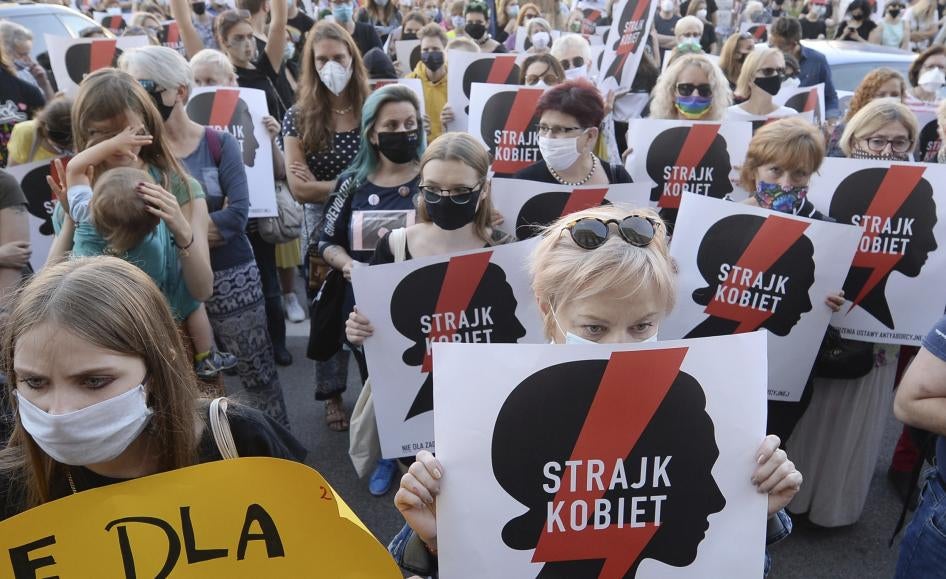As violence against women repeatedly grabs headlines during the COVID-19 pandemic, women across Europe are at the forefront of mass protests demanding government action to protect women from abuse.
Some argue that women shouldn’t risk their lives by protesting during a pandemic, but using women’s health as a reason for curbing action is a painful irony. Many women’s lives are already at risk, every day, often in their own homes.
Across the region, even before the pandemic’s onset, one in five women experienced domestic violence. A 2014 survey found that one in three women in the European Union had experienced sexual or physical violence since reaching the age of 15. Women’s rights groups have boldly called out governments’ inadequate response to this “shadow pandemic” amid mounting evidence that pandemic-related lockdowns bring a heightened risk of domestic abuse and create barriers to seeking help.
For example, France had a 30% increase in domestic violence reports during the first two weeks of its COVID-19 lockdown in March. Despite the government’s efforts to encourage domestic violence survivors to seek help, women’s groups told Human Rights Watch that some measures reflected a lack of expert input and that insufficient resources left service providers struggling.
It’s an ongoing problem, exacerbated but not caused by the pandemic. According to French government data, 146 women were killed by a current or former partner in 2019 – a rate of one every two and a half days, and 20% more than in 2018. Rates of domestic violence increased in the same time period by 16%, with 142,310 reports to authorities. A national consultation in 2019 on domestic violence in France promised large-scale measures, but funds are lagging far behind.
A year ago, thousands took part in demonstrations across France calling for urgent action against femicide and domestic abuse under the #NousToutes (All of Us) movement. The protest has continued online. In August, activists graphically marked a year of anti-femicide protests by covering a Paris wall with the names of 122 murdered women. Having effective measures in place is all the more urgent because France, like many European countries, recently entered a second lockdown.
Women take to the streets in Turkey and Poland
Despite the surge in domestic violence, some governments in Europe have threatened to cancel commitments to address violence against women. Again, women’s rights groups have answered en masse.
Large-scale protests erupted in Turkey following the killing of 27-year-old Pinar Gultekin by her former partner in July, one of at least 234 women killed in Turkey since the beginning of the year. Some politicians from President Erdogan’s ruling party have suggested that Turkey should withdraw from the Council of Europe Convention on preventing and combating violence against women and domestic violence, known as the Istanbul Convention. This would be a worrying step backwards in a country where hundreds of women are killed by current or former partners or male relatives every year.
Turkish women’s rights groups have called for action to address the country’s high rate of femicide, failure to protect women at risk, and lack of punishment for their killers. The number of femicides has risen annually since 2011 – the same year that Turkey signed the Istanbul Convention. Women’s groups have long criticised the government’s poor track record on implementing the treaty’s requirements, which establishes minimum standards for prevention and protection from violence and prosecution of offenders. These groups organised widespread protests across Turkey in August, expressing anger that, even as deaths mount, the government might seek to withdraw from a treaty meant to keep women safe from violence.
Activists in Poland also launched protests in the summer when the justice minister announced plans to withdraw from the Istanbul Convention. But this was only one of many mass demonstrations in the country in a busy year for women’s rights groups. The protests moved online in April because of COVVID-19 lockdown measures, creating a surge of public opposition to bills that would have further curbed abortion and sexuality education. The bills were sent back to committees for further work.
In October, when the constitutional tribunal announced a decision that will virtually eliminate legal abortion (despite Poland already having some of the strictest abortion laws in Europe), the Women’s Strike (Strajk Kobiet) movement organised what became the biggest demonstrations since the fall of communism in 1989. Fed up with the ruling Law and Justice Party’s repeated attacks on women’s and LGBT rights and the rule of law, crowds show no signs of fading, in spite of risks brought on by the pandemic and threats of prosecution or even violence.
Women have harnessed the power of protest elsewhere too. In Ukraine, they marched to urge their government to ratify the Istanbul Convention. And women in Spain demonstrated in their tens of thousands to call attention to violence against women and gender discrimination.
Spikes in domestic abuse during the COVID-19 pandemic and growing crowds may have garnered the world’s attention, but tackling violence against women requires long-term, systemic investment. Women’s groups are working to ensure that national leaders can’t look away when the pandemic subsides.









